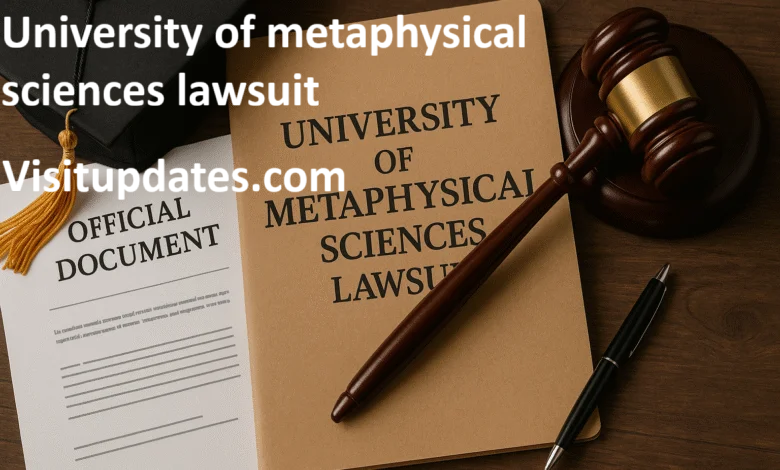University of Metaphysical Sciences Lawsuit: What Really Happened Behind the Controversy and Legal Battle

The University of Metaphysical Sciences lawsuit has been one of the most talked-about legal disputes in the alternative education sphere over recent years. What started as trademark disagreements between competing metaphysical institutions evolved into a complex, multi-year legal battle that captured the attention of students, graduates, and observers across the spiritual education community. With the case finally reaching resolution in University of Metaphysical Sciences Lawsuit May 2025, it’s time to unpack what actually happened, who was involved, and what it all means for metaphysical education moving forward.
Understanding the University of Metaphysical Sciences
Before diving into the legal drama, it’s important to understand what the University of Metaphysical Sciences (UMS) actually is. Founded by Christine Breese, the institution offers online degree programs in metaphysics, spiritual studies, and related fields. UMS operates as an unaccredited religious institution, providing certificates, bachelor’s, master’s, and doctoral degrees in metaphysical subjects. The school has built a student base University of Metaphysical Sciences Lawsuit interested in alternative spirituality, consciousness studies, and holistic approaches to education that fall outside mainstream academic frameworks.
Unlike traditional universities, UMS doesn’t seek regional or national accreditation from bodies recognized by the U.S. Department of Education. Instead, it positions itself as a spiritual and metaphysical institution operating under religious exemptions. This distinction becomes important when understanding both the nature of the University of Metaphysical Sciences Lawsuit legal disputes and the broader context of how these schools function in the educational landscape.
The Origins of the Legal Battle
The University of Metaphysical Sciences lawsuit didn’t emerge from nowhere. The conflict traces back to longstanding tensions between UMS and another metaphysical education provider: International Metaphysical Ministry (IMM), which operates the University of Metaphysics and University of Sedona. Here’s where things get interesting—Christine Breese, the founder of UMS, is actually a former student and graduate of IMM’s institutions. This graduate-turned-competitor dynamic added a personal dimension to what would become years of legal sparring.
The first lawsuit was filed on December 28, 2017, when IMM accused UMS of trademark infringement. According to court documents and statements from both parties, IMM alleged that UMS was using trademarked names and terms associated with IMM’s schools in ways that created marketplace confusion. This initial case reached a settlement on June 10, 2019, with both parties apparently agreeing to specific terms about how they would conduct their separate businesses going forward.
When One Settlement Wasn’t Enough
Just when it seemed the dust had settled, the University of Metaphysical Sciences lawsuit reignited. On October 14, 2021, IMM filed another lawsuit against UMS, this time claiming that the terms of the 2019 settlement agreement had been breached. This second legal action became the centerpiece of the controversy that would dominate the next several years.
The allegations centered on internet advertising practices. According to depositions and court filings reviewed during the litigation, IMM claimed that UMS deliberately used IMM’s trademarked names—including “University of Metaphysics,” “University of Sedona,” and “International Metaphysical Ministry”—as keywords in Google advertising campaigns. The accusation was that these ads would appear when potential students searched for IMM’s schools, redirecting traffic to UMS’s website instead. Evidence presented in the case included internal emails and testimony from employees discussing advertising strategies that specifically targeted competitor names.
The Advertising Controversy That Fueled the Fire

One of the most University of Metaphysical Sciences Lawsuit contentious aspects of the University of Metaphysical Sciences lawsuit involved digital marketing practices. Court documents revealed internal communications that appeared to show intentional strategies to capitalize on competitor trademarks. Depositions from key employees testified that certain advertising keywords matching IMM’s trademarked names were used in online campaigns. Internal emails surfaced during discovery that discussed running ads using specific search terms that included the names of IMM’s institutions.
UMS maintained throughout the process that any advertising overlaps were either accidental, industry-standard practice, or misinterpreted by the opposing party. The school’s representatives argued that they never intentionally sought to confuse students or mislead anyone about institutional identities. They characterized the litigation as predatory in nature—a larger institution with more resources attempting to squeeze out a smaller competitor through expensive legal pressure.
The Road to Dismissal
The University of Metaphysical Sciences lawsuit took several unexpected turns as it progressed through the court system. Trial dates were set, postponed, and reset multiple times as both parties engaged in extensive discovery, depositions, and legal motions. The case was scheduled for trial in May 2024, then pushed back, and eventually set for June 16-20, 2025 in Oakland, California. This would have been the third scheduled trial setting after previous continuations allowed for additional briefing on complex legal and factual issues.
However, just weeks before the June 2025 trial was set to begin, something shifted. Both parties entered into discussions about resolving the matter without going to trial. These negotiations, occurring in early May 2025, apparently addressed concerns about continued legal expenses, ongoing uncertainty, and the desire to establish clear boundaries for future operations. On May 12, 2025, the court dismissed the case with prejudice at the parties’ joint request. A dismissal with prejudice means the claims cannot be refiled—it’s a final resolution of those particular legal issues.
Settlement or Victory? The Competing Narratives
Here’s where the University of Metaphysical Sciences lawsuit becomes even more interesting: the two sides tell notably different stories about what the May 2025 dismissal actually means. UMS and its founder Christine Breese publicly characterized the dismissal as a complete victory. Their statements emphasized that there was no settlement payment, no admission of liability, and no finding that UMS had done anything wrong. They described the dismissal as vindication after years of what they termed “predatory litigation” designed to harm a smaller competitor.
On the other side, IMM released its own statement describing the outcome quite differently. IMM indicated that while the case was dismissed, it was because the parties reached “an acceptable resolution” and “settlement” that addressed IMM’s concerns about protecting their intellectual property and trademarks. IMM’s statements suggested they achieved their goals of establishing clear boundaries and securing their marks for the future, with processes in place to resolve potential disputes without returning to court.
What the Court Actually Decided
It’s crucial to understand what the May 2025 dismissal actually represents from a legal standpoint. When a case is dismissed with prejudice at the parties’ joint request just weeks before trial, it typically indicates some form of negotiated resolution, even if the terms aren’t publicly disclosed. The court itself didn’t rule on the merits of IMM’s claims or make findings about whether UMS engaged in the alleged conduct. No jury verdict was reached. No judge issued an opinion declaring one side right and the other wrong.
What we know for certain is this: both parties agreed to end the litigation, the scheduled trial was vacated, and the case was formally dismissed in a way that prevents those specific claims from being brought again. Whether this dismissal followed from a confidential settlement agreement, mutual concessions, or simply both parties deciding continued litigation wasn’t worth the cost remains somewhat unclear from publicly available information.
The Impact on Students and Graduates
Throughout the University of Metaphysical Sciences lawsuit, one group remained caught in the middle: the students and graduates of both institutions. Many students expressed confusion and concern about whether the legal battle would affect the value or recognition of their degrees. Others worried about their school’s reputation or whether their programs would continue to operate normally during the litigation.
Both UMS and IMM made efforts to reassure their respective communities. They emphasized that classes continued, programs remained available, and degrees would continue to be conferred regardless of the legal proceedings. However, the public nature of the dispute—particularly as both sides began making statements online—created uncertainty and sometimes anxiety among those affiliated with either institution.
Lessons About Metaphysical Education and Accreditation
The University of Metaphysical Sciences lawsuit highlights broader questions about how alternative education institutions operate and compete. Unlike traditional colleges and universities that pursue regional accreditation through recognized bodies, many metaphysical and spiritual education providers operate independently under religious or philosophical exemptions. This creates a marketplace where institutional reputation, student satisfaction, and word-of-mouth matter tremendously—making issues like trademark protection and marketplace confusion particularly sensitive.
The case also underscores the importance of clear boundaries and ethical marketing practices in the metaphysical education space. When multiple institutions offer similar-sounding programs in overlapping subject areas, distinguishing between them becomes crucial for students making enrollment decisions. The litigation served as a high-profile reminder that even in fields focused on consciousness, spirituality, and higher truth, practical business and legal considerations still apply.
Where Things Stand Now
As of the case dismissal in May 2025, the University of Metaphysical Sciences continues to operate and offer its programs. The school has emphasized moving forward without further legal entanglements and has publicly stated its intention to focus on serving students rather than engaging in ongoing disputes. Similarly, IMM and its affiliated institutions—the University of Metaphysics and University of Sedona—continue their educational missions, with leadership expressing hope that clear lines have now been drawn allowing peaceful coexistence.
Whether the resolution reached in May 2025 truly marks the end of tensions between these institutions remains to be seen. The fact that the case was dismissed with prejudice provides some finality, preventing the exact same claims from being relitigated. However, new disputes could theoretically arise over different issues or circumstances in the future.
The Bigger Picture
The University of Metaphysical Sciences lawsuit serves as a case study in the challenges facing alternative and spiritual education providers in the modern digital marketplace. As these institutions compete for students online, issues around search engine marketing, trademark usage, and brand identity become increasingly complex. The years-long legal battle demonstrated that even schools focused on transcendent spirituality and consciousness studies must navigate very terrestrial concerns about business practices, intellectual property, and competitive fairness.
For prospective students considering metaphysical education, the lawsuit offers important lessons. Do your research about any institution you’re considering. Understand what their degrees represent, how they’re recognized (or not recognized) in different contexts, and what distinguishes one provider from another. Look beyond marketing claims to understand the actual substance of programs and the reputation of institutions within their respective communities.
Final Thoughts on the Controversy
After years of legal wrangling, multiple lawsuit filings, countless hours of depositions, and preparation for a trial that ultimately never happened, the University of Metaphysical Sciences lawsuit ended not with a bang but with a negotiated dismissal. Both sides claim outcomes favorable to their interests, students and graduates of both institutions can move forward with less uncertainty, and the metaphysical education marketplace continues to evolve.
The controversy highlighted real tensions between competing visions, business practices, and interpretations of fair competition in the spiritual education sphere. It demonstrated that legal disputes in this space can be just as complex, expensive, and drawn-out as in any other industry. And it showed that even when institutions share philosophical commitments to higher consciousness and spiritual development, disagreements over practical business matters can lead to years of adversarial legal proceedings. Whether the resolution achieved in May 2025 brings lasting peace or simply a temporary pause remains to be written in the chapters ahead.



